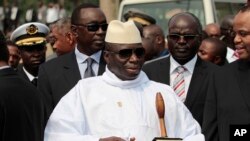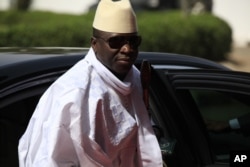The Gambian government is defending the arrest of several opposition leaders and their supporters. This, as the U.N. secretary-general has called for the immediate and unconditional release of those arrested.
The United States has also condemned what it calls the Gambian government’s severe response to recent peaceful protests.
Gambian security forces Saturday arrested Ousainu Darboe, leader of the country’s main opposition United Democratic Party (UDP) and some of his supporters. There are also reports that Solo Sandeng, the party’s National Organizing Secretary, had been tortured to death while in police detention.
Sheriff Bojan, Gambia’s information minister said he knows nothing about anyone being killed. But he said opposition leader Darboe and his “cohorts” broke Gambian law by holding a demonstration without permission from the police.
“Mr. Darboe is veteran lawyer and he’s quite an informed that in the Gambia just like in every other country there is something called the Public Order Act which forbids procession, street protests, meetings, and so forth without first seeking and being granted permission by the police. But he and his cohorts decided to completely flout that law, and in the Gambia, just like in any other country, there acts and reactions; there causes and effects. So, I don’t they have anyone to blame for their dispersal and subsequent arrests,” he said.
But Pa Samba Jow, spokesman for the Democratic Union of Gambian Activists in the Diaspora said Gambia’s constitution guarantees the right to peaceful protest.
“First of all, let us be very clear. Section 25, subsection 1-D of the Gambian constitution gives every Gambian the right to peacefully protest. So, it is absolute incorrect to suggest that one needs a permit to protest. But what is important to us is, what has those people done to warrant a brute that was used by the government to confront them. So the matter here is, if there are any law breakers, the law breakers are the government and the security forces because they violated the fundamental human and constitutional rights of Gambians by attacking peaceful protesters,” Jow said.
Bojan said those arrested will be taken to court in due time, but he said security and maintenance of the public is paramount in Gambia.
“The president of the Islamic Republic of the Gambia, His Excellency Sheikh Professor Alhaji Yahya A.J.J. Jammeh has been saying time and again that public law and order and security will not be compromised in the Gambia. The Gambia is known for its civility, is known for its stability, is known for its tranquility, and no one will be allowed to put a pin in that balloon of tranquility,” Bojan said.
Jow described Bojan as the minister of misinformation. He challenged the government to produce Solo Sandeng and others believed to have been killed by security forces.
“I wish that we were talking about somebody who was speaking for a credible government, but this is a government that has no credibility and of course what they have to do is to resort to denials. The simple matter here is that if Solo Sandeng is alive, if Fatoumata Jawara is alive, and if Ngoi Njie is alive, all they can do is to parade them on national TV and let them speak to the Gambian people to tell them that guess what, we are alive and well,” Jow said.
President Jammeh, who seized power in 1994, is regularly accused of rights abuses and of running Gambia with an iron fist.
Amnesty International in its 2015 annual report accused Jammeh’s government of enforced disappearances, torture, ill-treatment, custodian deaths and a flawed criminal justice system.
But Information Minister Bojan said most of those talking about human rights abuses in Gambia are former government officials who had been fired from the government and fled to Europe and America where they are now “stoking the fire of violence and anarchy."
“Right now in the Gambia, there are newspapers of all opinions. If you buy a newspaper in the streets you will see the most hard-hitting being printed against the government. So the Gambia is definitely a free country. Although we have issues like any other country, but I think it is a haven of peace. The Gambia is right now on the cuff of great things to come,” he said.
Bojan said Gambia has been notified recently that it will be hosting the 2018 Organization of Islamic Cooperation summit.
“A lot of good things are about to happen to the Gambia and nobody will be allowed to distract the government of his Excellency Sheikh Professor Alhaji Yahya A.J.J. Jammeh from developing the Gambia to where he wants it to be,” he said.
He also said President Jammeh last year granted amnesty to more than 320 inmates, some of them on death row.
Gambians will go to the polls at the end of the year to elect a new president.
Gambian opposition leader Lamin Waa Juwara of the National Democratic Action Movement Party last week called for presidential term limits in Gambia.
President Jammeh is one of a number of African leaders who have removed term limits from their constitution.
But Bojan said it was Gambians who voted to remove term limits.
“We have to be clear, before the 1997 constitution was ushered in, there was a referendum, and according to the outcome of that referendum, Gambians do not want term limits. If somebody is doing a good job, you don’t need term limits,” Bojan said.





